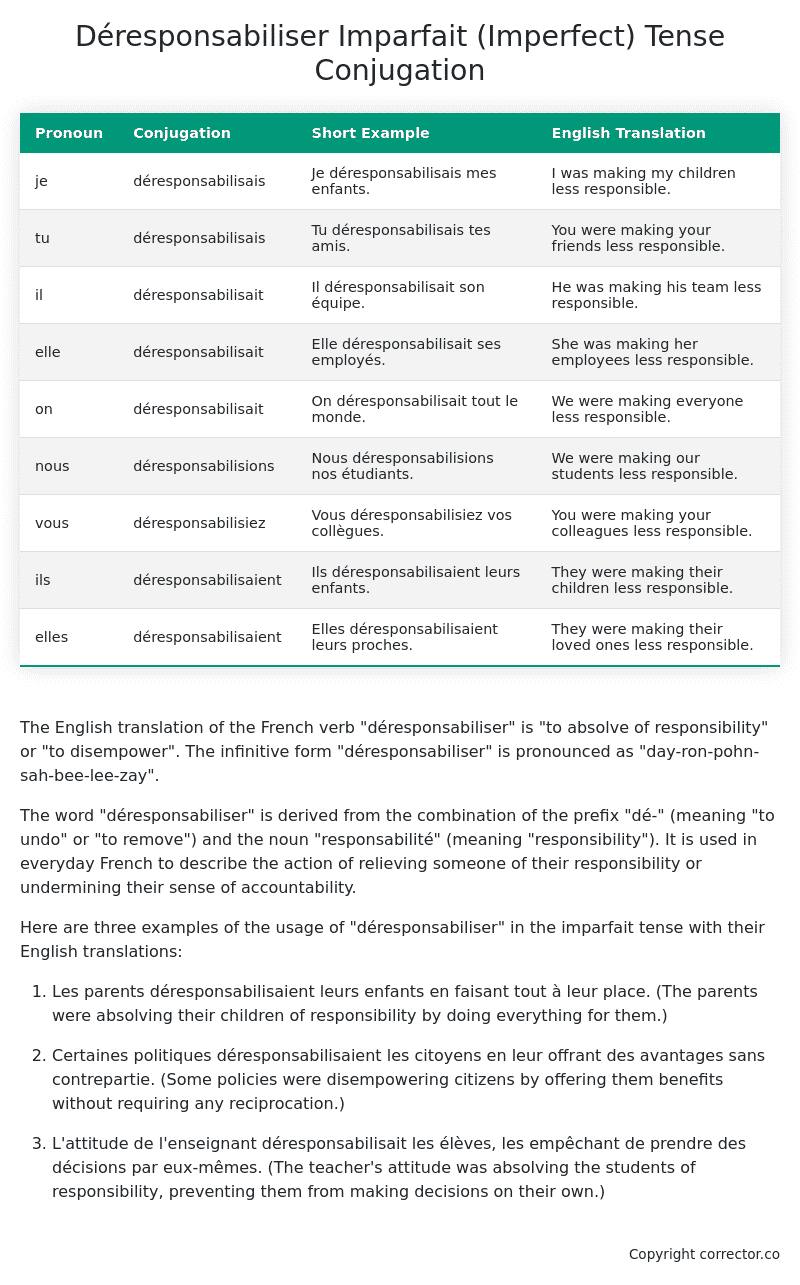Imparfait (Imperfect) Tense Conjugation of the French Verb déresponsabiliser
Introduction to the verb déresponsabiliser
The English translation of the French verb “déresponsabiliser” is “to absolve of responsibility” or “to disempower”. The infinitive form “déresponsabiliser” is pronounced as “day-ron-pohn-sah-bee-lee-zay”.
The word “déresponsabiliser” is derived from the combination of the prefix “dé-” (meaning “to undo” or “to remove”) and the noun “responsabilité” (meaning “responsibility”). It is used in everyday French to describe the action of relieving someone of their responsibility or undermining their sense of accountability.
Here are three examples of the usage of “déresponsabiliser” in the imparfait tense with their English translations:
-
Les parents déresponsabilisaient leurs enfants en faisant tout à leur place.
(The parents were absolving their children of responsibility by doing everything for them.) -
Certaines politiques déresponsabilisaient les citoyens en leur offrant des avantages sans contrepartie.
(Some policies were disempowering citizens by offering them benefits without requiring any reciprocation.) -
L’attitude de l’enseignant déresponsabilisait les élèves, les empêchant de prendre des décisions par eux-mêmes.
(The teacher’s attitude was absolving the students of responsibility, preventing them from making decisions on their own.)
Table of the Imparfait (Imperfect) Tense Conjugation of déresponsabiliser
| Pronoun | Conjugation | Short Example | English Translation |
|---|---|---|---|
| je | déresponsabilisais | Je déresponsabilisais mes enfants. | I was making my children less responsible. |
| tu | déresponsabilisais | Tu déresponsabilisais tes amis. | You were making your friends less responsible. |
| il | déresponsabilisait | Il déresponsabilisait son équipe. | He was making his team less responsible. |
| elle | déresponsabilisait | Elle déresponsabilisait ses employés. | She was making her employees less responsible. |
| on | déresponsabilisait | On déresponsabilisait tout le monde. | We were making everyone less responsible. |
| nous | déresponsabilisions | Nous déresponsabilisions nos étudiants. | We were making our students less responsible. |
| vous | déresponsabilisiez | Vous déresponsabilisiez vos collègues. | You were making your colleagues less responsible. |
| ils | déresponsabilisaient | Ils déresponsabilisaient leurs enfants. | They were making their children less responsible. |
| elles | déresponsabilisaient | Elles déresponsabilisaient leurs proches. | They were making their loved ones less responsible. |
Other Conjugations for Déresponsabiliser.
Le Present (Present Tense) Conjugation of the French Verb déresponsabiliser
Imparfait (Imperfect) Tense Conjugation of the French Verb déresponsabiliser (You’re reading it right now!)
Passé Simple (Simple Past) Tense Conjugation of the French Verb déresponsabiliser
Passé Composé (Present Perfect) Tense Conjugation of the French Verb déresponsabiliser
Futur Simple (Simple Future) Tense Conjugation of the French Verb déresponsabiliser
Futur Proche (Near Future) Tense Conjugation of the French Verb déresponsabiliser
Plus-que-parfait (Pluperfect) Tense Conjugation of the French Verb déresponsabiliser
Passé Antérieur (Past Anterior) Tense Conjugation of the French Verb déresponsabiliser
Futur Antérieur (Future Anterior) Tense Conjugation of the French Verb déresponsabiliser
Subjonctif Présent (Subjunctive Present) Tense Conjugation of the French Verb déresponsabiliser
Subjonctif Passé (Subjunctive Past) Tense Conjugation of the French Verb déresponsabiliser
Subjonctif Imparfait (Subjunctive Imperfect) Tense Conjugation of the French Verb déresponsabiliser
Conditionnel Présent (Conditional Present) Tense Conjugation of the French Verb déresponsabiliser
Conditionnel Passé (Conditional Past) Tense Conjugation of the French Verb déresponsabiliser
Conditionnel Passé II (Conditional Past II) Tense Conjugation of the French Verb déresponsabiliser
L’impératif Présent (Imperative Present) Tense Conjugation of the French Verb déresponsabiliser
L’impératif Passé (Imperative Past) Tense Conjugation of the French Verb déresponsabiliser
L’infinitif Présent (Infinitive Present) Tense Conjugation of the French Verb déresponsabiliser
L’infinitif Passé (Infinitive Past) Tense Conjugation of the French Verb déresponsabiliser
Le Participe Présent (Present Participle) Tense Conjugation of the French Verb déresponsabiliser
Le Participe Passé (Past Participle) Tense Conjugation of the French Verb déresponsabiliser
Struggling with French verbs or the language in general? Why not use our free French Grammar Checker – no registration required!
Get a FREE Download Study Sheet of this Conjugation 🔥
Simply right click the image below, click “save image” and get your free reference for the déresponsabiliser imparfait tense conjugation!

Déresponsabiliser – About the French Imparfait Tense
NOTE: To take a deep dive into all the French tenses then see our article on Mastering French Tense Conjugation.
Formation of the Imparfait Tense
For regular -er verbs:
For regular -ir verbs
For regular -re verbs
Common Everyday Usage Patterns
Description of Past Habits
Background Information
Mental and Emotional States
It’s employed to express emotions, thoughts, or physical sensations in the past. For example: “J’étais content quand il est arrivé.” (I was happy when he arrived.)
Ongoing Actions
Points to Note About the Imparfait Tense
Passé Composé vs. Imparfait
Conditional
Si Clauses
Narration
I hope you enjoyed this article on the verb déresponsabiliser. Still in a learning mood? Check out another TOTALLY random French verb imparfait conjugation!


